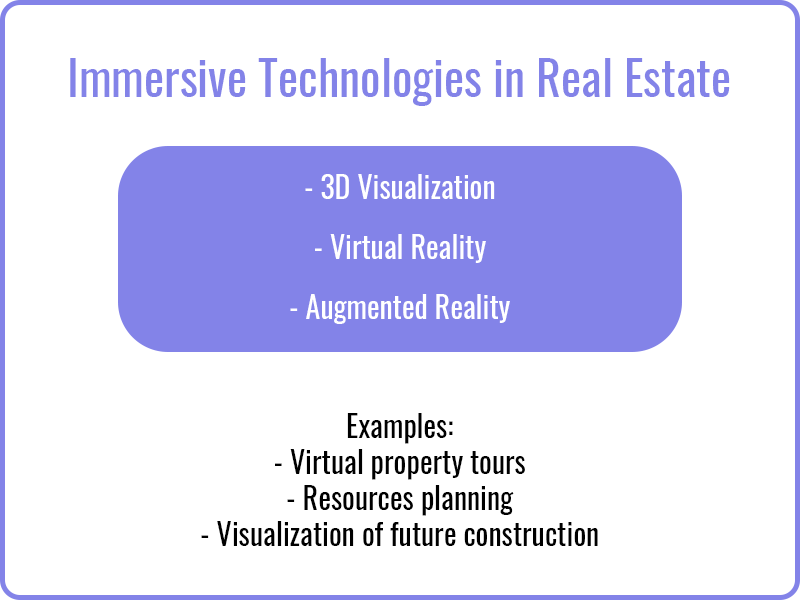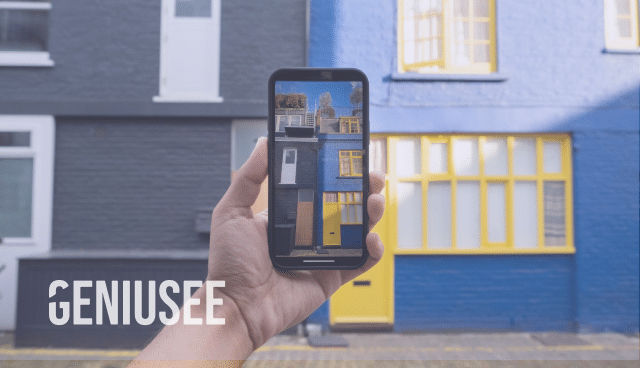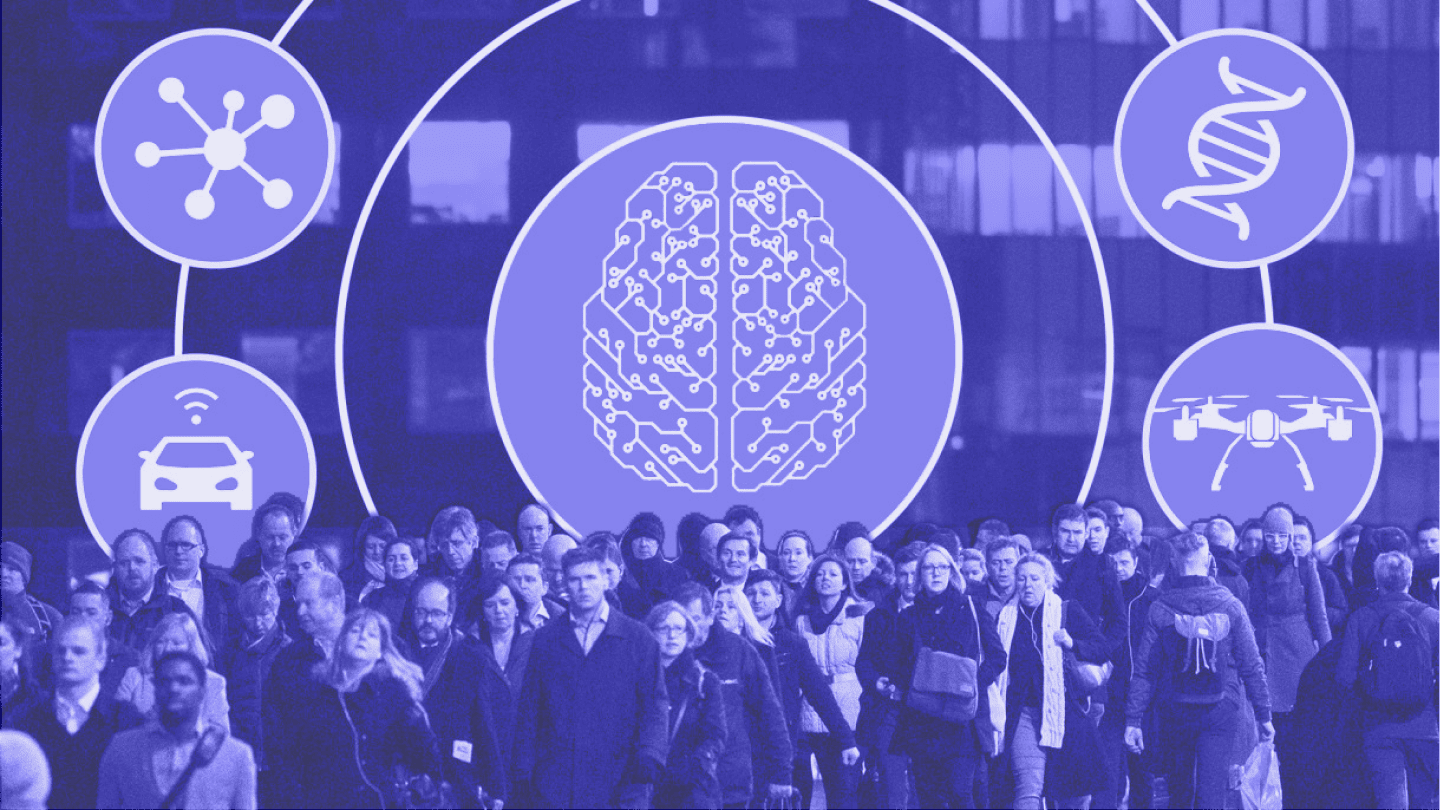To succeed in this business, you must stay ahead of the curve and understand the trends in real estate and technology shaping the industry in the coming years. Failure to meet changes can result in missed market opportunities compared to other players. Statista experts predict the worldwide real estate industry will be worth $654.40tn in 2025.
This article investigates 15 recent real estate technology solutions poised to bsuinesses in the next 2 years. These new technologies will help you gain market knowledge, serve clients better, and make your business more profitable.
Real estate technology trends for agents
AI technology produces precise real estate valuation assessments, making it easier for stakeholders to estimate real estate prices. For example, agents can use VR tours to allow potential buyers easy access while saving time. The secure nature of blockchain transactions delivers essential trust and transparency to real estate deals. Adopting the late directions can help you resolve critical industry challenges while allowing you to exploit new growth potential. Let's talk about the latest technology trends in real estate that will help you transform your business.
#1. Artificial intelligence
Artificial intelligence (AI), machine learning (ML), and virtual assistants are undoubtedly the future of real estate technology companies.
According to StartUs Insights, AI-based solutions comprised 26% of innovations in 2024. This one of the best real estate technology can be used in many facets, such as:
Conducting historical data analysis
Optimizing pricing strategies
Automating customer service tasks
Determining global real estate market trends
Delivering accurate valuations using previous data
Helping identify consumer needs
Recommending relevant properties
Enhancing the overall purchasing experience
For instance, AI-powered application development can help agents identify patterns in customer behavior via real estate marketing automation. Google Ads is improving online ads to target the right audience. Using AI, agents can outpace their competitors and connect with suited people, boost conversions, and offer better service to potential buyers.
Overall, AI is one of the most critical developments in real estate technology that will likely play an even more prominent role in the future.
💡Example: Rex Homes uses AI algorithms to place ads on different channels, such as social media and real estate marketplaces. It is based on target audience metrics, such as purchase history. Their specialists also use programmed robots that can answer almost any question about the object they're showing potential buyers. As a result, within two years of launch, they closed 231 deals, raised $25.5 million, and reduced brokerage commission to 2% compared to the average of 5-6%.
#2. Immersive technologies
Immersive technologies allow you to provide prospective clients with an immersive 3D experience of a property. This technology can help you visualize what it would be like to live in sight with the power of virtual or augmented reality.
Many real estate companies already give potential customers virtual tours of their houses. This way, customers can visit several properties from anywhere worldwide, helping potential buyers make more informed decisions and providing a much better customer experience.
Additionally, builders and architects can use VR and AR to create 3D models of a potential project before committing resources to build it. Now, they can iterate faster and validate ideas before investing in construction.
💡Example: Artisan Home Design uses visual staging for empty properties, which allows them to increase the average sales profit by 17% and sell 87% faster.
PIXO uses virtual reality training in construction, which helps learn the same material 40–60% faster than in a traditional setting.

#3. Internet of Things
Internet of Things (IoT) smart devices can do more than monitor a building's physical environment. They can also help scan activity and protect against unauthorized usage. For example, IoT sensors in various systems can track water pressure and electricity usage. Yet, what does that mean? If any indicators are off the charts, you must update the system.
In the coming years, IoT development will connect with other parts of property management.
For example, this technology in real estate can be used to:
Help regulate heating and cooling systems to save energy and reduce costs for property owners
Connect with smart locks so you can control access remotely or based on specific conditions
Enable agents to provide a more personalized experience
Monitor customer activity on the property so that agents can respond to any inquiries quickly
Send automated notifications about maintenance issues or late payments
💡Example: CBRE uses IoT sensors to collect energy usage data to improve building management and optimize operations. Such sensors allowed the service to identify HVAC system issues and cut energy costs by 20%. Thanks to IoT, CBRE is also helping Shell reach its goal of reducing greenhouse gas emissions by 2035 by 20%.
#4. Building management systems (BMS)
Building management systems (BMS) are a newer property technology trend. These software tools allow real estate firms to monitor and control temperature, humidity, lighting levels, air conditioning, security systems, etc.
You can also use such systems to automate scheduling maintenance work or control the flow of people into specific areas. BMS double-checks efficient resource usage and helps turn ordinary buildings into smart homes. A BMS can save time and money by automating some parts of building management. Systems allow the organization to use saved resources in other areas.
Additionally, they allow property managers to monitor the physical environment of residential and commercial buildings in real-time. This usually helps them detect potential issues before they become serious.

Based on customer needs and preferences, BMS can automatically adjust a room's temperature according to the settings or turn off lights when no one is in the room.
💡Example: BMS is mainly used to cut energy costs. Even governments see the benefit of saving up to 30% of energy. For example, the UK Ministry of Housing, Communities and Local Government recommends installing BMS in commercial buildings with heating, air conditioning, and ventilation systems that exceed 290 kW. In the UK, they are recommended for buildings with an effectual output of over 290 kW. Further, they help maintain buildings and fix potential issues before they become a huge problem.
#5. Big data analytics
Agents can gain valuable insights into customer behavior, market trends, and investment opportunities by leveraging big data and predictive analytics. Analytics enables them to make timely, informed decisions that improve business performance.
Real estate professionals use it to analyze market-related big data to identify properties that fit their investment strategy criteria. This data can include everything from listing descriptions to demographic data, real estate industry trends, and potential tenants' preferences.
Big data and analytics can help real estate agents better understand their audience. Sellers can comprehend their preferences and needs by collecting and analyzing customer data.
Such data analytics will enable more personalized services, which could increase customer satisfaction. Additionally, it can be used to target marketing campaigns and promotions better.
💡Example: The real estate listing platform Redfin uses big data analytics to provide users with insights. For example, it can show how likely a property will sell within a certain period, creating a sense of urgency for potential buyers. However, this isn’t some empty marketing ploy but rather actual data.


Thank you for Subscription!
#6. Property management software
CRM systems are a lifesaver in the real estate market. They allow agents and property managers to easily store and manage client information, monitor deals in progress, and ensure the secutiry of sensitive documents.
Real estate data management software can benefit the real estate industry in many ways:
Streamline communication between agents, landlords, and tenants
Efficiently process applications, leases, and property maintenance
Enable agents to easily keep track of their various real estate listings, as well as store all relevant documentation and property data securely in one place
Provide real-time updates about the status of a property and allow a real estate agent to respond quickly and manage any issues that arise
Offer various analytics tools for identifying trends in customer behavior, measuring their performance, and gaining valuable insights into the market
💡Example: TurboTenant allows managers to screen potential tenants within minutes. They can check their credit history, criminal background, and eviction cases to decide if they can be trusted.
#7. Blockchain technology
The distributed ledgers in commercial real estate tech can securely record property titles and contracts and facilitate real estate transactions between buyers and sellers. With blockchain development, all stakeholders in the real estate sector will benefit from improved transparency, security, and efficiency when managing property titles and contracts.
Blockchain-based smart contracts can speed up property transactions and make them safer, preventing fraud and data manipulation. Digital contracts are legally binding agreements between multiple parties that are signed online. They confirm that all the conditions in the agreement are automatically fulfilled without manual effort.
Technology trends in real estate like this eliminate middlemen, reduce transaction costs, and facilitate faster completion of real estate transactions.
💡Example: PropertyClub doesn’t just offer a secure real estate platform for closing deals using smart contracts. It even has its coin, though it accepts property transactions in other currencies.

#8. Property aggregation platforms
Numerous companies now list properties online for their clients to view. What if they could use a platform that collects data from many sources and gives them easy access to updated listings?
That's where property aggregation platforms can do wonders in the real estate industry. They make it easier for clients to find the perfect property while also allowing them to compare prices and gain industry insights.
These platforms provide agents with a comprehensive market analysis by gathering data from public record databases, regional real estate associations, and more.
Property aggregation platforms can provide prospective clients with virtual tours of properties for purchase. Technology also helps agents scan market changes and find opportunities they might have missed.
💡Example: Property aggregators use crawlers like Apify to collect and store data from different sources in one database. For example, the Czech platform Realitio lists a property on its website within 10–20 minutes after posting it to the source website. The property aggregation platform keeps up with the source sites, helping reduce the number of inactive properties listed.
Quick health check
Is your business analysis good enough? Are you sure? Check out how your company is doing
#9. Drones
Using drones in real estate could change how properties are marketed and inspected. This technology may also increase property and land values.
Better marketing materials. Drones give agents a bird's eye view of properties to create stunning aerial videos and photos to attract prospective buyers.
Improved pre-sale activities. Drones can quickly inspect rooftops and other hard-to-reach places to check for potential issues or damages.
Tracking of changes in the real estate market. Drones can map out entire neighborhoods and record data collected from price fluctuations. This allows real estate investors and agents to analyze the market more accurately and make informed investment decisions.
Overall, this technology offers faster and more accurate inspections, improved marketing capabilities, and invaluable insights into the real estate market. It's no surprise that it is predicted to be widely adopted by real estate companies in the coming years.
💡Example: Agents are not limited to aerial photography. Some agencies even offer virtual property tours guided by drones with high-resolution equipment. Keller Williams and Realtor.com use drones for this very purpose.
#10. Data security
Aside from governmental regulations, protecting sensitive data is a matter of reputation for any real estate business. Estate businesses possess a lot of important information about real people, which can be exploited in phishing attempts to steal bank details or personal credentials.
Many software companies and startups offer solutions for encrypting data, monitoring and preventing cyberattacks, securing network traffic, and managing risk. Yet, there are also tools for tracking regulation compliance so that you don’t run into issues with data security laws.
Cybersecurity tools enable security staff to manage risk, access systems to manage vulnerabilities, and backup data remotely, giving you a safer working environment in real estate development sites.
💡Example: Tokeny offers a blockchain platform for real estate security tokens. Tokenization helps combat properties' poor accessibility due to physical location, low liquidity, and siloed data. Tokeny was hired in 2020 to fund real estate in Luxembourg. As a result, the platform helped cut compliance and administrative costs by 90%.
#11. Digital twins
A digital twin is a virtual replica of objects, systems, processes, or even people in the real estate industry. It faithfully mirrors the form and functions of the actual entity and stays synchronized with it.
Real estate professionals can create a model of a future building or even an entire block. This model helps predict how well the building will fit into its environment, withstand various climatic conditions, and handle structural loads.
Digital twins provide value throughout the entire lifecycle of a property:
Planning phase
Architects and developers can build detailed digital replicas of future buildings or developments.
These models predict structural aspects, energy consumption, space usage, and environmental impact.
Construction phase
Once construction begins, digital twins offer real-time monitoring capabilities. It ensures that the actual build closely matches the initial design. This process:
Helps streamline construction
Provides immediate insights to address any discrepancies
Post-construction phase
During this stage, digital twins allow stakeholders to:
Optimize maintenance schedules
Enhance energy efficiency
Simulate the effects of potential modifications on building performance
Urban planning phase
In addition, digital twins support adaptive urban planning. Such technology is a dynamic model that supports more intelligent decision-making in changing city landscapes. They can address critical issues like:
Traffic flow and congestion
Optimization of public services
Sustainable urban development
💡Example: In residential real estate, brokerages and agents use digital twins for VR tours. Property managers can offer prospective buyers immersive three-dimensional replicas of listed properties.
On the commercial front, real estate agents and property managers employ digital twins on a larger scale. Yet, what is it for? Everything is simple; this technology creates comprehensive business models that encompass entire ecosystems of substantial listings.
#12. Fractional property investment
Fractional investment allows you to invest in real estate by owning a smaller share of a property. Investors choose additional participation because it is cheaper than purchasing a management asset. Some types of fractional ownership allow for privacy.
Investors do not keep track of the real estate implications. The management company is responsible for the maintenance of the facility and the income from rental income between owners. Investments also include a one to two-week vacation in hotels once a year.
💡Example: Robinhood has entered fractional ownership, allowing users to invest in real estate with smaller amounts of capital. Property investors can access a range of fractionalized properties through the Robinhood app. This enables them to diversify their portfolios in the real estate market. Such an innovative approach democratizes property investment, making it more accessible to a broader audience.
#13. Mobile applications usage
Mobile apps have changed the real estate industry offering new tools for both real estate agents and buyers.
Real-time communication is a cornerstone, fostering interaction among agents, buyers, and sellers. Financial tools like mortgage calculators empower users to make informed decisions. Push notifications inform users about property changes and real estate market trends.
Transaction tracking enhances transparency, offering a clear view of progress from property viewing to closing. The mobile app provides key insights and personalized experiences. It delivers real-time information and tailored recommendations based on individual preferences.
💡Example: Apps like Zillow provide users with property search, virtual tours, and real-time market insights, simplifying buying and selling processes. Additionally, real estate platforms like Redfin offer personalized recommendations based on users' liking, creating a more efficient and user-friendly experience.
#14. ML and automated valuation models
14% of commercial real estate companies invest in machine learning in their decision-making. Companies use image recognition to analyze the pixel layout of a photo. ML helps them gather details about a home to classify and estimate its value accurately.
ML algorithms determine whether a remodeling project makes sense before listing a home. This technology automates routine tasks and eliminates human error in home valuation.
💡Example: In 2023, Opendoor implemented AI into its pricing algorithms. The algorithms estimate value by analyzing market trends, macroeconomic parameters, and home conditions.
#15. Geolocation intelligence
Geolocation is an emerging technology in real estate development. It helps to find a property's exact location and visualize property data, county maps, flood zones, and soils to estimate its value.
The volume of geolocation intelligence exceeded $18 billion in 2023 and will continue to grow at a CAGR of 15.8% over the next decade.
💡Example: Data Appeal provides investors with actionable location data based on their investment objectives. Analyzing data sets, including traffic, age, and gender helps identify the best properties for real estate investors.
How we help real estate businesses scale
Geniusee team shows skills through various compelling cases, demonstrating the transformative impact of our expertise in real estate app development.
Case 1: HappyHouse
Geniusee worked with Happy House to create a modern rental property management app that transforms old offline processes into a smooth online experience.
With our strong knowledge of React and integration services, we built a platform that connects tenants with landlords and handles tasks like tenant screening, maintenance requests, and payment processing.
The project's success involved overcoming challenges in payment integration, frontend alignment, and framework integration.
Case 2: Twinly & Polku
Geniusee's proficiency in IoT development shone in the collaboration with Polku Innovations, a leading Finnish real estate service development company. We created a single platform using IoT solutions to improve property management by making digital twins for buildings. We also addressed the challenges of complex systems and large amounts of data from smart devices. Our advanced technology helped optimize requests and integrate different databases. This partnership led to:
a long-term collaboration that brought forth IoT-based, data-driven solutions
a boost for property management digitization
powerful 3D models for comprehensive building management
This success story exemplifies Geniusee's commitment to reshaping the real estate landscape through innovative and transformative technology solutions.
Looking for real estate application development or upgrades?
Geniusee is a software development company that helps real estate businesses, property owners, agents, tenants, and brokers keep pace with the fast-moving real estate industry.
Our team of tech professionals will provide your company with custom real estate and mobile software development, such as:
real estate website and mobile apps
real estate platforms
real estate crowdfunding platforms
listings or complex internal automation systems for real estate companies
real estate configurations
sales tools for real estate, and more
We offer real estate software development to help you effectively manage, sell, lend, check, or buy real estate assets.
Conclusion
The next few years will be fascinating for the real estate industry. As technology advances rapidly, new tools and services are emerging that will revolutionize business.
From property aggregation platforms and drones to predictive analytics systems and custom software solutions, there's no denying the industry is changing drastically.
For any real estate company, keeping up with software development trends is essential to stay competitive. And if you’re thinking about leveling up your real estate game — get a free consultation with the Geniusee team, and we'll show you how custom software can make a real difference.





















